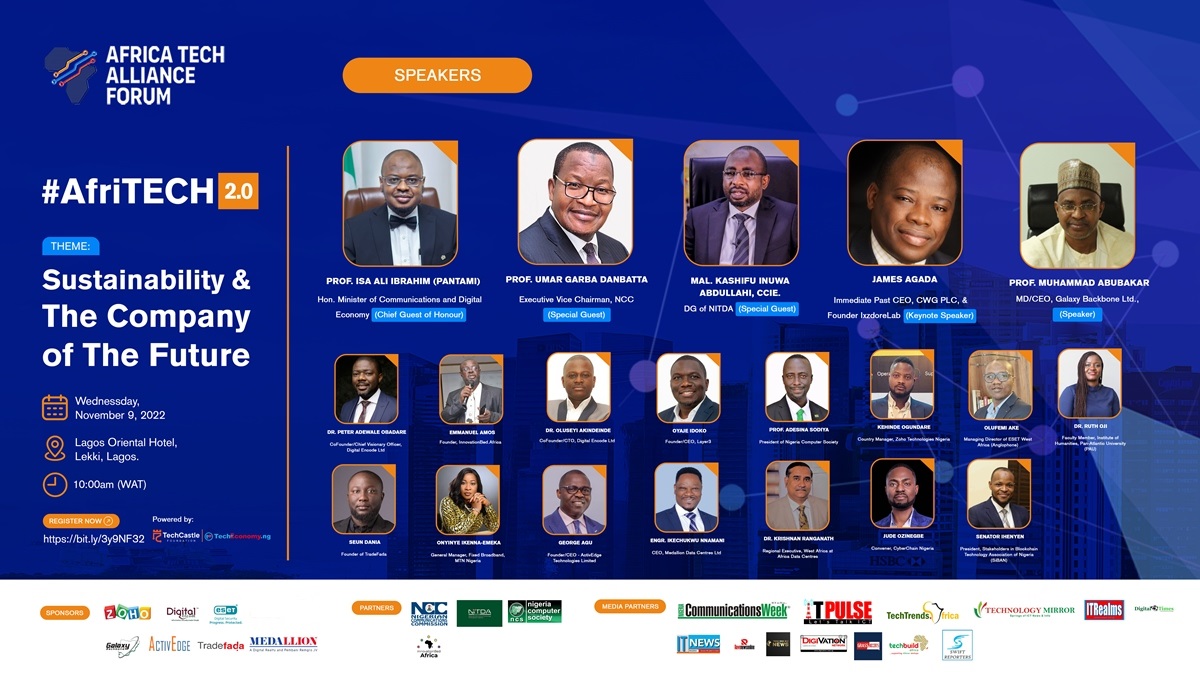The Africa Tech Alliance Forum (AfriTECH 2.0) is set to hold on November 09, 2022 on a theme that encompasses the current technology trends in our world today — ‘Sustainability and The Company of the Future’.
Some topics which would be critically analyzed by experts so as to point us in the right direction to attain a resilient future and keep thriving irrespective of hiccups are Blockchain | Cryptocurrency | CyberSecurity and The Future of Money, Cloud Computing in 5G Era: Everything-As-A-Service, Creating Sustainable Future through Connectivity and Building Sustainable Future for Startup Ecosystem: NITDA’s Perspective.
Blockchain | Cryptocurrency | CyberSecurity and the Future of Money
Blockchain, cryptocurrency, cybersecurity. These are three of the buzziest topics right now in the business world. But why? Find out at AfriTECH 2.0
Blockchain, an open, distributed ledger of data that can’t be changed or hacked because it’s stored on thousands of computers around the world is currently used by banks to record transactions and track assets; while other companies such as Microsoft leverage it for tracking software patches; and now some people are using blockchain for things like tracking food safety inspections or even paying taxes online.
On the other hand, Bitcoin was first launched in 2009 by Satoshi Nakamoto (who never revealed his true identity) as an alternative digital currency system that would be independent of any central bank or government. Since then, there have been over 1,000 cryptocurrencies created (and thousands more mimicking Bitcoin), all vying to become the next big thing!
However, while there are plenty of different ways people can get involved with cryptocurrency right now – whether buying it on exchanges like Coinbase/Binance/HitBTC etc.; mining various cryptocurrencies like Ethereum etc; trading ‘futures’ contracts w/exchanges like CBOE etc.; investing into ICOs (“initial coin offerings”) via coinmarketcapetc – we’ve still got some way to go before mainstream adoption becomes widespread…, especially when compared against where things were just five years ago when nobody knew what “blockchain” even meant!
What if I say the future of money is blockchain, cryptocurrency and cybersecurity? We’d find out if I’m wrong on November 9, 2022.
CyberSecurity is the next big thing and is already becoming more mainstream because it protects us from hackers who want to access our personal information so they can steal from us by selling it on dark web markets like AlphaBay or Hansa Market.
Cloud Computing in 5G Era: Everything-As-A-Service
The cloud is the new frontier of computing.
Imagine a world where you could access all your programs and data from anywhere, anytime—and not just on your phone, but on any device you want, too.
That’s the promise of 5G, which will usher in an era of Everything-As-A-Service (EAAS).
At AfriTECH 2.0, experts will cover everything you need to know about 5G, how it works, and how it’s changing our lives. The discussion would also cover what this means for business owners who want to take advantage of 5G’s potential as an enterprise solution.
Cloud computing is already making its way into 5G era—and with EaaS in mind, it can only get better!
Cloud computing has been a huge success in the telecommunications industry and is the use of remote servers to host applications and data, rather than using local servers. The benefits of cloud computing include fewer hardware requirements because it can be accessed from anywhere, scalability in terms of amount of users or bandwidth required, cost savings because it is not necessary to have as many servers as there are users or transactions and many more to be discussed.
The 5G era will be an exciting time for businesses that utilize cloud computing, especially when it comes to everything-as-a-service (EaaS). EaaS allows businesses to outsource their IT needs completely over the internet. This means that they won’t have to worry about managing servers or hiring a staff of IT workers.
Creating Sustainable Future through Connectivity
The future of sustainable development depends on a connected world. Broadband connectivity is not just a means to an end but an opportunity to create a sustainable future through connectivity.
Connectivity has been the key to the growth and development of every industry, from agriculture to health care. Developed countries have used connectivity to connect people and businesses, while developing countries are using it to connect people and businesses in order to improve their quality of life.
But why is connectivity still not decentralized? Find out at AfriTECH 2.0
Sustainable development requires connectivity for all aspects of human life: food production, healthcare, education, transportation, and more. Connectivity enables us to work together toward our common goals—and it’s also good for business!
We’re all connected. We’re all getting smarter. We’re all learning from each other, and we’re all working to make a better world for future generations.
But what does this mean? How do we get there? And how do we ensure that the world we leave behind is sustainable for us and for our children?
Building Sustainable Future for Startup Ecosystem: NITDA’s Perspective
The National Information Technology Agency, NITDA, will host a discussion on how we can build a sustainable future for the startup ecosystem.
The startup ecosystem is a vibrant and evolving ecosystem that is growing at an unprecedented rate. However, there are several challenges facing this sector.
These include issues like cybersecurity, access to funding, and the lack of skills needed by startups to compete effectively in global markets. In response, NITDA is working with partners from government, academia and industry towards creating a sustainable future for this sector by developing technologies that will help these startups thrive in Nigeria.
Including tech startups, media companies, investors, and government agencies—who will discuss how they are building their business models and what they need to help them grow further, there would be room for everyone to share their ideas and learn from each other’s experiences.

























































